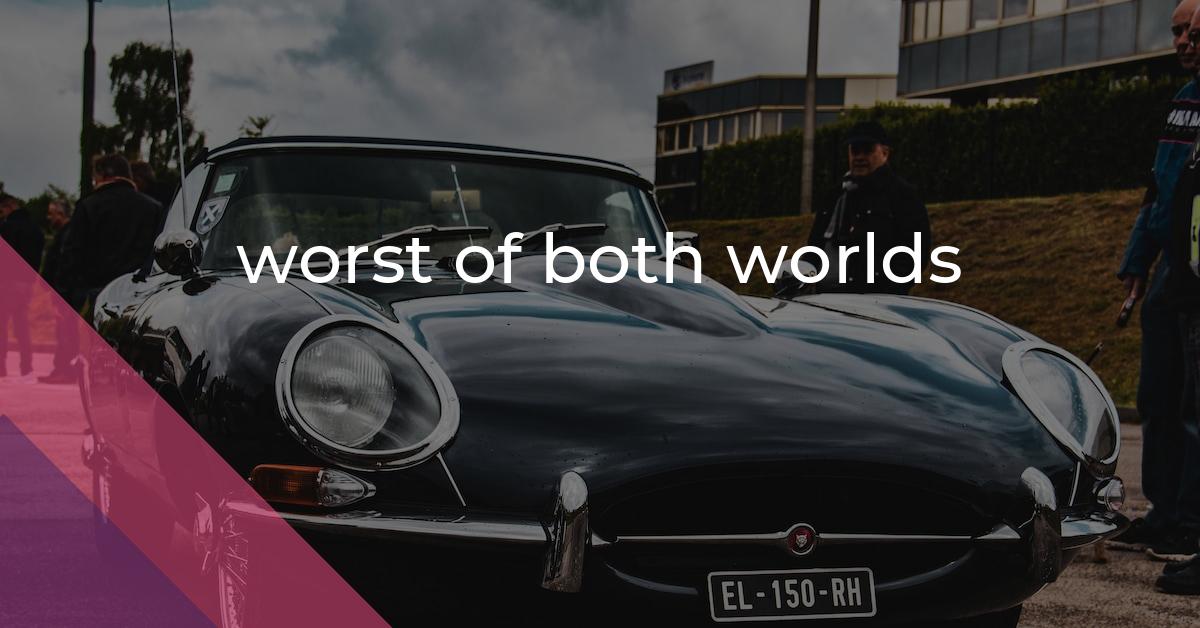worst of both worlds: Idiom Meaning and Origin
What does ‘worst of both worlds’ mean?
The idiom "worst of both worlds" refers to a situation where someone experiences the negative aspects or disadvantages of two different options or scenarios, without enjoying any of the benefits or advantages.

Idiom Explorer
The idiom "you can't say fairer than that" means that a situation or offer is as fair as it could possibly be, leaving no room for complaint or criticism.
The idiom "wrack and ruin" conveys the idea of complete destruction or extreme deterioration. It is often used to describe the state of something that has been severely damaged or ruined beyond repair. The phrase combines the words "wrack," meaning to wreck or destroy, and "ruin," meaning the state of being destroyed or in decay.
The idiom "worst comes to worst" means in the worst case scenario or in the most extreme situation possible.
The idiom "worse for liquor" is used to describe someone who is visibly affected by the consumption of alcohol, often implying that they are behaving in a reckless or foolish manner.
The idiom "worlds apart" means to be completely different or opposite from each other.
The idiom "world-beater" means a person or thing that is exceptionally talented, successful, or superior compared to others in the world. It conveys the idea of being a top performer or achieving great accomplishments on a global scale.
The idiom "something awful" is used to emphasize the extreme or intense nature of a situation, event, or feeling. It suggests that the thing being described is exceptionally bad, unpleasant, or severe.
Dark dance
"Worst of both worlds" is a commonly used idiom in the English language. It combines two negative aspects or outcomes to emphasize the unfavorable nature of a situation. The exact origin and history of this idiom are uncertain, but we can infer certain aspects about its etymology based on its usage and meaning.
This idiom is typically used to describe a situation where an individual experiences or has to deal with the most undesirable aspects of two different scenarios or options. It highlights the negative consequences or disadvantages of a particular situation, suggesting that the individual is burdened with the drawbacks of both options instead of enjoying their benefits.
The idiom is a play on the phrase "best of both worlds," which conveys the idea of enjoying the advantages or benefits of two different things simultaneously. By using "worst" instead of "best," the idiom emphasizes the contrast between a highly unfavorable situation and the ideal situation one would hope for.
While there is no specific information available on the exact origins of this idiom, it likely emerged as a creative way to convey extreme dissatisfaction or a particularly unfavorable outcome. It may have been commonly used in spoken language before appearing in written texts, explaining the lack of detailed historical records.
The idiom "worst of both worlds" is frequently used in discussions about the challenges and drawbacks of certain choices or decisions, as well as illustrating the negative aspects of combining incompatible elements or ideas. It is especially prevalent in informal conversations and writing, where its succinctness and clarity make it easy to comprehend and relate to.
While the precise origins of the idiom "worst of both worlds" remain unclear, its meaning and usage are relatively straightforward. It effectively conveys the concept of experiencing the most undesirable aspects of two different scenarios simultaneously, highlighting a particularly unsatisfactory outcome. Its presence in everyday language reminds us of the complexities and contrasts inherent in life's choices and experiences.
Example usage
Examples of how the idiom "worst of both worlds" can be used in a sentence:
- Jessica's new apartment is located in a noisy neighborhood and has terrible insulation, giving her the worst of both worlds.
- The new diet soda claims to have all the taste of regular soda and none of the calories, but in reality, it has the worst of both worlds: an artificial aftertaste and no nutritional value.
- John's new job requires him to work long hours with little pay and provides no career growth opportunities. It's the worst of both worlds for him.
More "comparison" idioms



